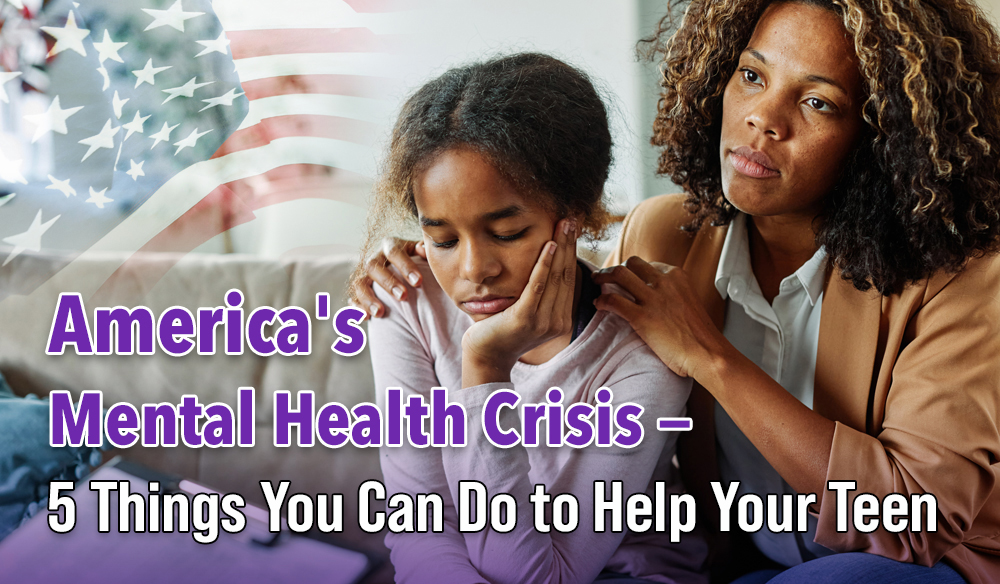America’s Mental Health Crisis – 5 Things You Can Do to Help Your Teen
Ever since the pandemic, things have gotten weird.
Okay, maybe they were weird before, but that year, it was like the weird came out and shook its moneymaker in all our masked faces.
It may have had something to do the shutdowns, experimental vaccines, drag queen story hour, men claiming they can have babies, and later, a Supreme Court Justice who couldn’t even define the word “woman.” (I screamed at the TV as if trying to help a contestant on the game show Jeopardy, “WHAT IS AN ADULT FEMALE HUMAN, ALEX!?”) And don’t even get me started on the ongoing boosters we were expected to dutifully roll up our sleeves for, despite the growing knowledge… that they didn’t work!
Even worse things were happening to our school-aged kids. Online classes preached CRT, telling our children that they were either racist by birth or hopeless, eternal victims. Other educators zoomed lessons on the coming climate change apocalypse. They were told gender was fluid and life was pointless.
They were isolated at home, away from friends, hating math class together, and missing proms and graduations. Depression among our youth was a crisis even before 2020, and the loneliness of social quarantine made it that much worse.
After things reopened and wokeness was embraced by a new administration in Washington, DC, kids were groomed by teachers and the internet to change their gender, undergo chemical castration, puberty blockers, and surgical mutilation. This amid false claims made to unwitting parents that it was all in the name of mental health. Lies!
Before going further, it’s worth noting a small but significant upward trend in mental health among America’s college students, as reported in a study by Eric Kaufmann, a professor at the University of Buckingham, released last week. It stops short of suggesting a significant trend away from what we’d still call a mental health crisis among youth in the U.S. The primary focus of the report was a significant decrease in transgender identifying college students (decreased by nearly half) and a lesser decline in other non-heterosexual identities.1 It suggested the decrease in queer identity was brought on by better mental health, though I have to wonder if the inverse is also true.
How Is Your Teen?
It’s been encouraging to see the Charlie Kirk effect, which has young people embracing hopeful concepts like faith, marriage, one day having children, hard work, and standing for freedom in numbers not seen in many decades.
Still, many teens are struggling. My own daughter went through a three-year suicidal depression beginning her senior year in high school. I have painful memories of driving her to a hospital on several occasions because she expressed imminent plans to kill herself. This was happening during a time in our city when teen suicide was at a high point, with 15 children ages 10-17 taking their lives in just one year – a cluster of five from a single high school. We continue to thank God she recovered and was not among those tragedies.
That’s why we ask how your child is doing and hope you are staying tuned in to their emotional and mental standing. Do you know what to look for?
Here are a few signs that may merit further investigation. Kids who suffer from some level of depression can be recognized with one or several significant and persistent behavioral changes. They may:
- Seem persistently sad
- Keep to themselves, disconnecting from peers and family
- Have changes in their academic performance or grades
- Show no interest in things they normally enjoy
- Exhibit a change in their regular routine or rhythms
- Seem unenergetic compared to how they were before
- Sleep too much, or hardly at all
- Become secretive and less talkative
- When they do talk, their words are negative, lacking hope
- Begin to engage in cutting or other self-harm (though this is often well hidden)
- Seem to care less and neglect hygiene
- Gain weight or lose it, with a significant change in eating habits
Your child may not show all of these, but if your gut tells you something isn’t right, then it’s time to act. Trust that instinct, and seek help. If you aren’t sure what to do, you can contact a counselor yourself to discuss your approach and receive guidance, or you can find a therapist to speak with and assess your child.
Why Are Teens Struggling?
Our kids face a variety of challenges and influences that may play into the decline in their mental health and happiness. Here are a few of the perils we think may be contributing factors:
- Living Life Online – Our teens (and we) are glued to our smartphones and devices for many hours each day. A recent Pew Research study found that nearly half of teens admit to being online almost constantly, with about half reporting spending several hours a day online. Less than 10% make up a small minority who are much less engaged online.2 Through social media, they have a 24-hour online stream tempting them to compare their popularity, likes, looks, and experiences to hundreds of friends, celebrities, and influencers. It’s alarming when you consider that even some of those who created social media said they wouldn’t let their own kids use it. It was a telling revelation in the docudrama, The Social Dilemma.
- Social Isolation – they are connected via devices, disconnected in real life, and lonely.
- Dark Entertainment – The entertainment industry (movies, TV shows, gaming, etc) has become increasingly dark, with more than 1500 horror films released in 2024. Pornography holds many in soul-killing bondage, and even cartoons are riddled with sexuality, gender propaganda, and glorification of the demonic.
- Cyberbullying – A few years ago, it became trendy to tell people to die. Students are ganged up on online. There have even been reports of some encouraging others to commit suicide. More than a quarter of American teens have been victimized by cyberbullying.
- Spiritual Influence – Though taboo to discuss in some circles, recognition of spiritual, even demonic influences that have oppressed teens (and adults) is starting to be recognized. Dr. Natalie Atwell, our guest on this week’s podcast, is a licensed counselor and author who has been shining a light on the spiritual aspects of mental distress. She helps her clients through traditional therapeutic methods and spiritual intervention. Don’t miss our eye-opening discussion about the effect of darkness and the demonic on mental health.
5 Things You Can Do to Help Your Teen
- Stay Vigilant – Observe and listen to your kids. Don’t let the busyness of your schedule push them out of your knowing what they are doing – or going through. Note any behaviors or words that seem out of place or different. Pray for wisdom, asking God to show you anything you need to know about your child. Trust your mom-gut, it’s a powerful gift God placed in you.
- Seek Christian Counseling – If you sense emotional trouble brewing, find a Christian counselor. We should point out that not all Christian therapists understand the spiritual influences at play in your child’s life, so be sure to dig a little deeper when choosing one. Still, if you can’t find someone who does believe or understand that realm, still, engage a Christian counselor- getting started with traditional therapies and methods could be just what your loved one needs.
You may also need to consider seeing your child’s physician or a psychiatrist. Some medications can be helpful, though not a guaranteed solution, so tread cautiously.
- Be Available to Talk and to Listen – From my sleep-deprived experience, too many times these are late-night conversations when you are bone tired, but your teen is ready to talk. It’s worth the sacrifice. As mamas, we must be there for it all. Your listening ear and calm responses, even when what they say may shock you, will build trust and make you a person your son or daughter can go to when they are hurting. Don’t lecture or try to talk them out of how they are feeling. Ask questions like, “What might be causing you to feel this way?” or “Can you tell me what you are going through?” Then, listen.
- Encourage a Healthy Lifestyle – As a family, prioritize getting enough sleep, putting away devices at a decent hour, eating a reasonably healthy diet (nobody’s perfect), going to church, and spending time together around the table. Model moderation with your own smartphone use. Plan non-phone fun times as a family – and encourage your teen to do the same with their friends. Why not host a movie night for your child and their friends? Have everyone put their phones in a basket before they all hit the rec room for food, fun, and a flick.
- Don’t Give Up – No matter what your child struggles with – whether it is depression, gender dysphoria, social anxiety, self-harm, substance abuse, pornography addiction, or something else, mamas are the ones who will contend for their own as long as needed. And remember, Jesus can give grace, forgiveness, and mercy to anyone who comes to Him. Nothing you or your child has done is more potent than the truth, love, and restoration found in Christ.
There is hope, and there are people who can come alongside you to help. Even if the struggle seems too long to bear, you can bear it. Don’t ever give up on your kids, and don’t ever stop praying. Just don’t go it alone.
You may find it helpful to check out our previous blogs that go a little more in-depth on this topic: The Saddest Generation – Teens are Giving Up: How to Bring Back Hope, and The Saddest Generation: 5 Clues to Spot Depression and 5 Ways You Can Help.
Here are a few resources if you need assistance:
988 Suicide and Crisis Lifeline (also you can text 988)
Focus on the Family Counseling Consultation
(They offer a one-time free session, maybe a good place for initial guidance)
Podcast Note: This week our podcast focused on “Spiritual Forces in Mental Health”. Dr. Natalie Atwell spoke about how many teens and young adults struggle with anxiety and depression. What their parents don’t know is that those mental health challenges can have spiritual root causes. Dr. Atwell has an intense desire to find biblical answers to mental health concerns. She currently leads a private counseling practice in Charlotte, North Carolina and is an adjunct faculty member at Liberty University. She is an author and the creator of Mental Warrior Courses focused on “Weird Influences of Mental Health.” Listen for her insight on
helping the teens in your life HERE.
2 Pew Research: Teens and Internet, Device Access Fact Sheet
***




